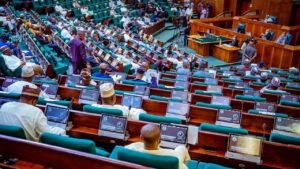Foreign exchange pressures threaten Nigeria’s economic stability — Report
By Sodiq Adelakun
PwC Nigeria’s Economic Outlook for 2024 has indicated potential difficulties for Nigeria in managing its debt servicing next year, attributing the issue to fluctuations in the foreign exchange market.
The report outlines seven key trends expected to influence the Nigerian economy in 2024.The analysis suggests that Nigeria’s public debt is likely to stay high as a result of a growing budget deficit.
The government is expected to continue facing substantial expenses in order to fulfill its debt service obligations and tackle the considerable fiscal deficits, according to a recent report.
The report also highlighted that a decline in revenue could potentially raise the deficit to GDP ratio, which reached a peak of 123 percent in the first quarter of 2023.
Additionally, it referred to a World Bank report that cautioned about the possibility of the debt service to GDP ratio escalating to 160 percent by 2027 if significant fiscal reforms are not implemented.
It stated, “The public debt stock of N87.9 trillion in Q3 2023 may increase further in 2024 due to the budgeted deficit of N9.18 trillion and proposed additional borrowing of N8.88 trillion in 2024.
“Furthermore, if revenue shortfall occurs, the deficit to GDP may further increase. Though the debt stock to GDP is low at 37.1%, the debt servicing to revenue ratio remains high at 124 percent as of H1 2023.
“Servicing external debt in 2024 may remain challenging due to exchange rate volatility and potential devaluation of the naira.”
In June last year, the Central Bank of Nigeria (CBN) announced the unification of the foreign exchange market which sent the exchange rate rising to almost N800/$ from $1/471.
Recall that the external debt stock of state governments increased by 42 percent after the unification of the FX market in June. Prior to the CBN’s policy, the external debt stock of the 36 states and FCT stood at $4.56 converted to N2.01 trillion using the prior fixed exchange rate of the CBN. An increase in the exchange rate means Nigeria would have to cough out more naira to service her external debt which currently stands at $41.5 billion as of Q3, 2023. The naira has lost almost 100 percent of its value since the action of the CBN in June.




